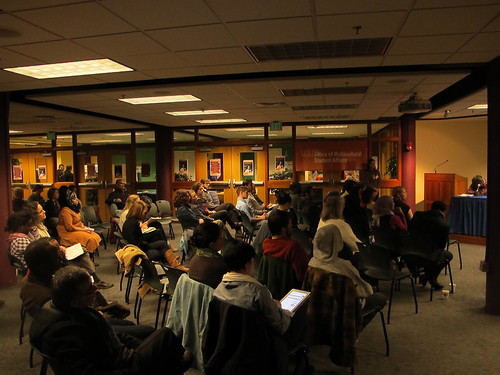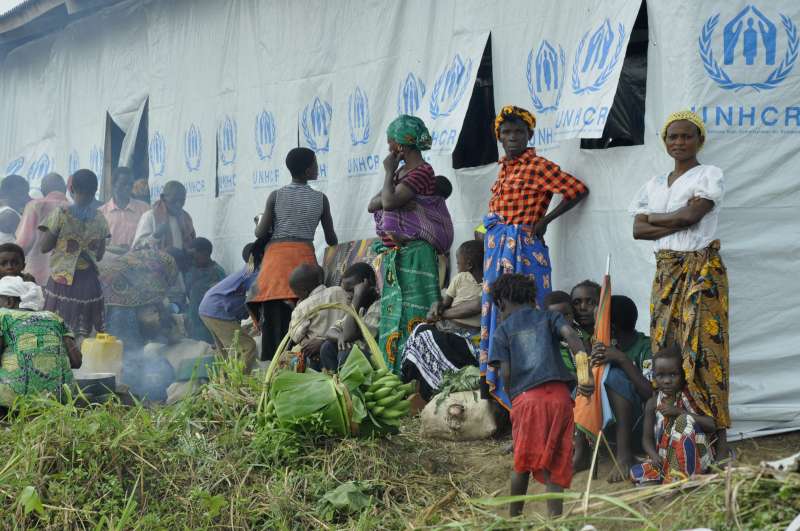Nor are there jobs for your college graduate kids!
Just now as I turned off the TV, President Obama was being interviewed about how to create more jobs and yesterday the Republicans were announcing their plan to flood the job market with both uneducated and educated immigrants for their big business donor friends, yet here is a story from Maine boo-hooing about no jobs for educated refugees!

From Maine Public Broadcasting Network. (Hat tip: ‘pungentpeppers’) An Iraqi with a college degree from Iraq took part in panel discussion on jobs hosted by Catholic Charities of Maine among others. I guess there are no more struggling job-seekers among the Americans in Maine!
Portland resident Sarah Mahdi came to the U.S. with a college degree, but, like many immigrants, has had trouble getting it recognized in the U.S. It’s not an unusual problem. Maine educators and other service providers are now looking for ways to make it easier for educated immigrants to find suitable jobs or further their educational opportunities.
[…..]
“When I first came to the States I just wanted to study,” said Mahdi, who was among a handful of immigrant students sharing their experiences Wednesday night at a panel discussion in Portland. The panel was organized by the University of Southern Maine’s Office of Multicultural Student Affairs, and Catholic Charities Maine.
New Mainers Resource Center uses tax dollars to help immigrants prove they actually have a legitimate college degree.
One place immigrants can turn to is the newly-established New Mainers Resource Center, one of the several service providers on hand at Wednesday night’s event to offer advice. The center’s program co-ordinator, Sally Sutton, is talking to George Dakonsa, who arrived here from the Democratic Republic of Congo seeking asylum four months ago.
“I have a bachelor’s degree in economics and finance,” he says. “I’d like it if they can help me to evaluate.”
The center was recently opened by Portland Adult Education with the aim of specifically helping college-educated immigrants in their search for suitable employment or further education. Co-ordinator Sutton says with immigrants like Dakonsa come an opportunity to breathe new economic life into the state. [Would someone please explain exactly how they are breathing new economic life into the state!—ed]
That bad ‘ol Maine governor is at it again—-how dare he try to balance the state budget!
The New Mainers Resource Center, however, may end up being a short-lived venture. It’s meant to be a two-year pilot project funded at $75,000 a year.
But the program could be eliminated after its first year – just one small part of the nearly $34 million in spending cuts being recommended in a report commissioned by the LePage administration, looking for ways to balance the two-year budget.
Governor LePage needs to continue working on something else! Maine has become a go-to state for asylum seekers.
Check out this article from The Free Press from earlier this month:
Maine has become known to many central African asylum seekers as a place where they can find community support as well as temporary financial assistance while they have their visas and work permits approved. Often they arrive on tourist or business visas, sometimes with forged documents. While many asylum seekers are well educated and come from financial means, the money doesn’t last long and many end up in homeless shelters while their applications are being processed.
Maine happens to be one of a handful of states that does not require proof of citizenship. All asylum seekers must show is that they are applying for asylum. Unlike official refugees, such as many in the Somali and Sudanese populations who are resettled in Maine by the U.S. State Department [and Catholic Charities—ed], asylum seekers do not qualify for any other state or federal benefits while they are applying for asylum. The whole asylum approval process can take from one to two years and it typically takes at least 150 days for asylum seekers to be eligible to legally work once approved for asylum.
See also, Maine the welfare magnet one of our top posts of all time.
One more thing….so much for the importance of educated refugees!
Reader ‘tomasrose’ sent us this comment to our earlier post about Bhutanese low-skilled laborers and the US State Department (as headhunters) bringing them in for businesses:
I spoke with a refugee from the middle east just last week and he confirmed, of course, refugees are coached in what to say to improve their chances at coming to the U.S.. One of the things he said is they hide any education they might have. If the U.S. thinks you are educated your chances of moving to the U.S. are lower. He cited an M.D. from Baghdad who told refugee officials he was a menial laborer and, presumably, would be happy to work the same jobs in the U.S.. Had he advertised his credentials as a doctor, he would have a better chance at going to one of the Scandinavian countries, but to get the U.S. he had to really dumb his resume down.


